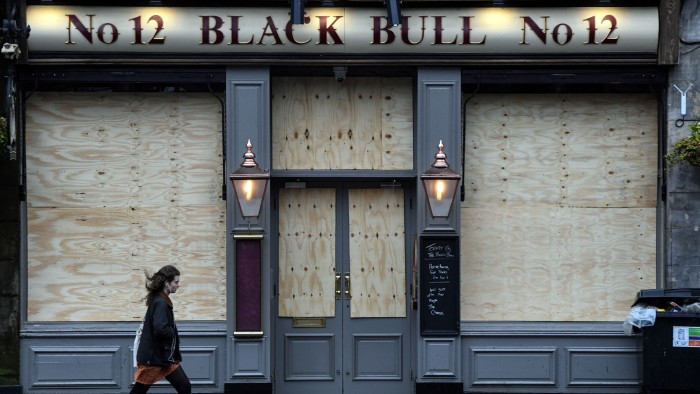Unlock the Editor’s Digest for free
Roula Khalaf, Editor of the FT, selects her favourite stories in this weekly newsletter.
When Mitchells & Butlers signed its first securitisation of a pub chain, Beyoncé and Jay-Z were proclaiming themselves Crazy in Love and many of those graduating from university this year hadn’t been born. A lot has changed since 2003 — except the £200mn a year M&B must still find to cover the promises it made back then.
Like noughties-style cargo pants, so-called whole business deals pledging future cash flows are back in fashion. Shareholders beware: these are more constricting and they don’t always age as well. Chicken wing chain Hooters, which recently filed for bankruptcy in the US, was one user of the structure. Ditto cocktail-bar chain TGI Fridays.
Nearly $12bn of such deals were arranged last year — the second-highest level since the shadow cast by the 2008 financial crisis. That included the biggest ever, raising $3.4bn to finance the takeover of US fast-food chain Subway, backed by existing and future franchise agreements, licensing agreements, intellectual property royalties and franchise fees. The relatively tasty yields the bonds carry is encouraging more investors to sniff around, ratings analysts say.
Whole business deals allow companies to secure extremely long-term financing and at lower rates than they’d get tapping the regular bond market or banks. But in exchange, investors get to ringfence the assets backing the deal. Borrowers must meet exacting targets before dividends or other payouts can be made.
Securitisations rely on future expected regular cash flows. Subway, for example, has stores, and even some franchisees, that go back 30-plus years. That’s a comforting record for creditors. British pubs, part of the UK’s social fabric, once seemed similarly reliable: regardless of who ran a pub, they’d be pulling pints and paying rent. M&B’s £1.9bn deal sparked a market stampede from rivals.
But what the deal arrangers can’t anticipate is what happens in the next 30 years. British pubs are still considered institutions, but since those deals, their numbers have slumped and their cash flows whomped by a smoking ban, the recession following the financial crisis, a long-term decline in drinking habits and the Covid-19 pandemic.
In most cases, the debt is too expensive to restructure. The deals are also complex, featuring several different groups of bondholder. They also get less efficient as time goes on because even as the sums owed are paid down, all the assets remain pledged to the end. For M&B, that means a pub estate worth £3.7bn is trapped backing £1.2bn of debt.
Fans will argue that pub operators’ mere survival to this point, after all their trials, is testament to the deals’ ability to support borrowers. But even in 2003, committing to long-term strictures looked risky. In the intervening years, a financial crisis, pandemic and chaotic geopolitical situation have made that even more true. Some noughties crazes are returning, but it’s not clear this financial technique deserves to be one of them.
